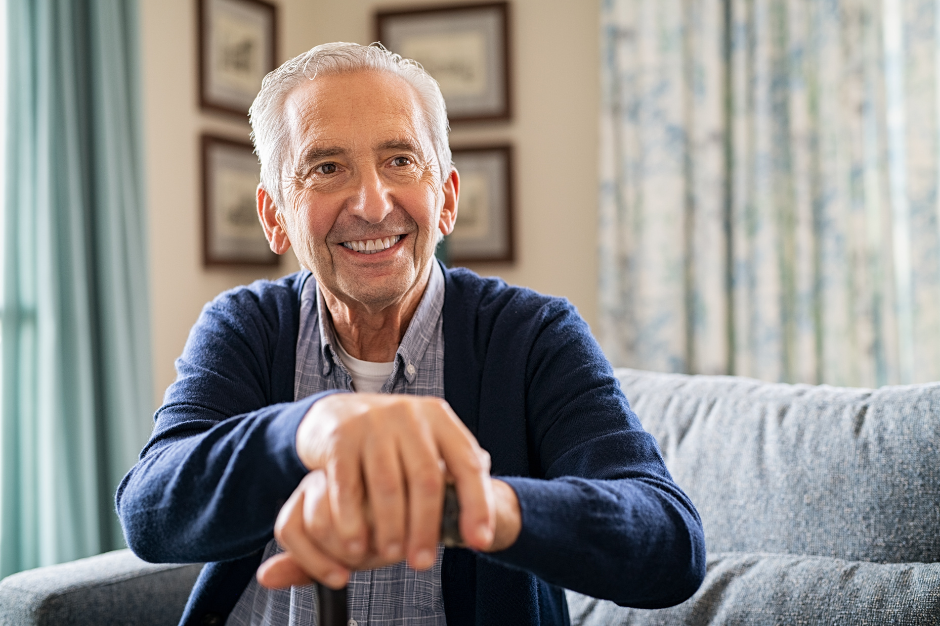As we get older, remaining independent for as long as possible will be a top priority for many of us. According to research highlighted by the Good Care Group, 97% of older people want to remain in their own homes for the rest of their lives, rather than move into residential care.
It’s inevitable that as people age, they’ll need more assistance. Putting in place the right support to keep them safe and maintain self-sufficiency can ensure the elderly stay in charge of their own retirement and keep them healthy and active for longer.
As well as providing the infrastructure at home to help older people complete everyday tasks, it’s also important to prepare for situations when something goes wrong. The risk of falling rises with age and more than one in four over-65s fall each year.
Equipping a loved one with a personal alarm or installing a smart home monitoring system in their home can offer peace of mind in case of an emergency. ‘Long lies’, where an individual remains on the floor for an extended period of time can have a negative impact on health and severely damage confidence, so it’s important to have a fall alarm on hand.
The benefits of staying independent
Staying independent offers a wide range of benefits for older people, as it can maintain both their physical and mental health. For instance, living independently can help to keep elderly individuals’ minds active, which reduces some of the memory loss and other cognitive decline issues often associated with old age.
The link between good physical health and strong mental health is well-known, and this works both ways. People who keep their minds active are also more likely to remain physically active as well. Retaining the responsibility to stock the cupboards or tend a garden ensures an active lifestyle is second nature as a person grows older.
Maintaining independence also helps give older people a greater sense of purpose and identity. Being able to set their own routine, keep in contact with friends and relatives and continue doing activities they enjoy helps prevent feelings of depression or isolation, which AgeUK notes are very common among older people.
The challenges facing older people with respect to their independence
As well as any physical limitations that people may find themselves struggling with as they get older, one of the major barriers to independence for many individuals may be concern about what might happen should they have an issue.
Falls, for example, are a common worry for older people. The NHS notes this is the leading cause of injury for elderly individuals, with around a third of over-65s and half of those aged 80 or above experiencing a fall at least once a year.
Worries about this can easily lead to older people curtailing their activities, so it’s vital that they have the support and assistance they need to gain peace of mind and minimise their risk. Loss of confidence is a huge threat to independence as we age and just one fall can be worrisome.
Of course, it’s not only older people themselves who worry about their health as they age. Family members will naturally be concerned and are likely to want to check in on elderly loved ones more often.
While well-intentioned, relatives constantly offering to help can in itself lead to an older person feeling like their independence is slipping away. There will also inevitably be times when the family is not around and it’s during these periods that additional infrastructure, such as personal alarms for the elderly, can be very reassuring.
How to preserve independence
To deal with these concerns, it’s vital older people have the right equipment and support networks available. This can start, for instance, with the addition of items such as railings, stair lifts or even simply moving kitchen items to more accessible cupboards.
But while making adaptations to the home in order to facilitate an easier life is a good start, it’s only one part of promoting independence. For example, it’s also important for older people to feel confident to get out and about into their gardens or the local community.
Staying at home can feel like a safer option, but it can actually increase social isolation, so encouraging loved ones to visit friends and relatives or go shopping where possible can be hugely helpful. If people are worried about what might happen if they leave their home, there are a range of tools and technologies such as pendant alarms which can be attached to the wrist or a keychain to offer peace of mind and connect them to support networks or emergency services.
When choosing a personal alarm for the elderly, it’s important to consider their individual needs. If your loved one can still get out and about on their own, be sure to select a device with GPS capability. That means you or the monitoring team will be able to obtain their location immediately should they press the emergency button.
Maintaining independence isn’t just about ensuring older people are physically capable of looking after themselves. Being able to make their own choices about their everyday activities, giving them as much input and control over their lives as possible, contributes hugely to better mental health and acuity as people age.
With the right solutions, such as personal alarms, monitoring and assistance technologies, not only will older people enjoy the benefits of maintaining independence for longer, both they and their families can get greater peace of mind they are safe in their own homes or when completing tasks like going to the local shops.
